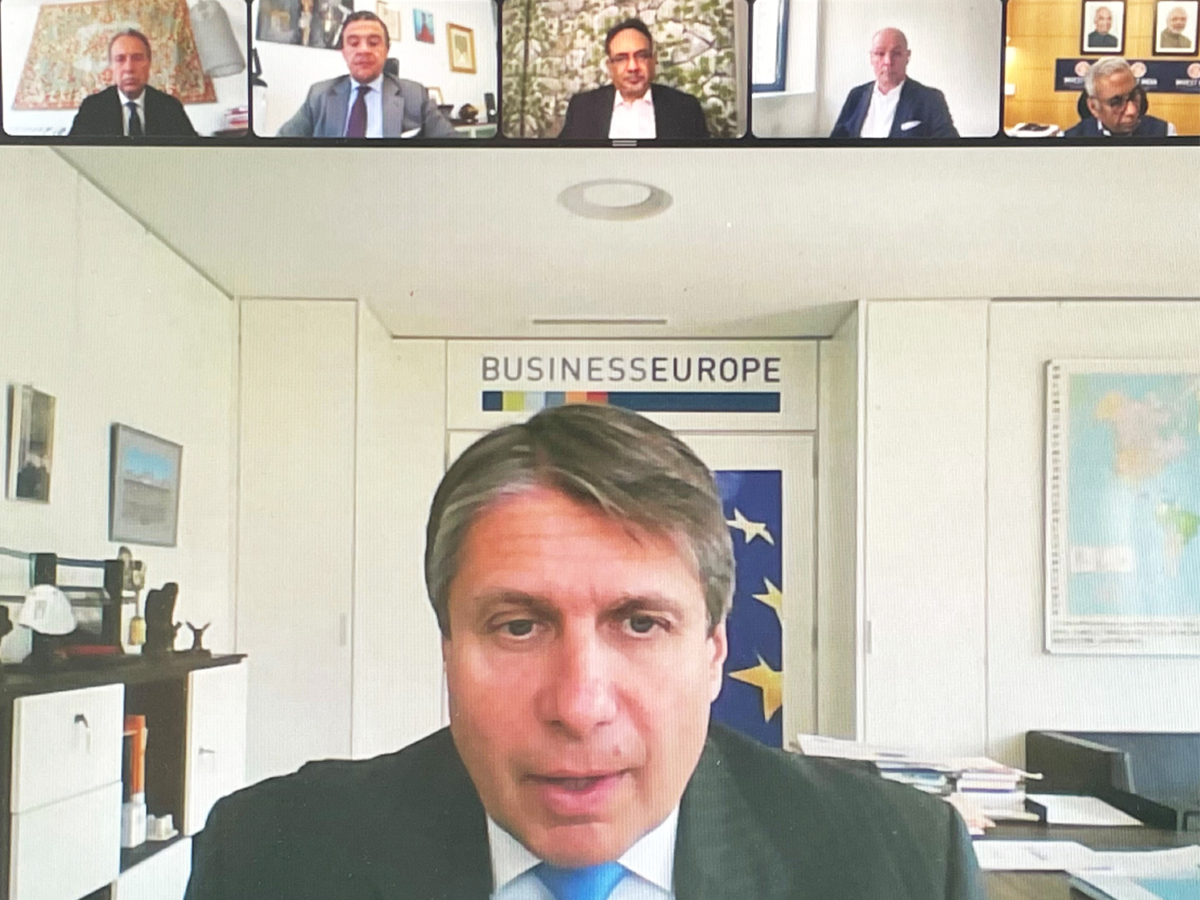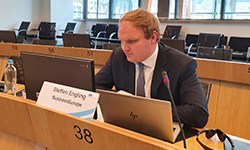BusinessEurope Headlines No. 2022-15
EU and India business leaders discuss investment opportunities and global trade challenges

At the EU-India Business Leaders’ Roundtable on 28 April, participants discussed how to encourage bilateral investment between the EU and India by identifying investment challenges and opportunities, as well as ways to resolve the current disruptions in global value chains. The event was organised by BusinessEurope together with Invest India and the European Business & Technology Centre. In his opening remarks, BusinessEurope Director General Markus J. Beyrer highlighted the importance to enhance EU-India economic cooperation, especially at a moment when the EU is trying to diversify trade flows and find partners that can fill the trade gap left by Russia. Participants gave concrete input on ways to solve horizontal barriers to improve the bilateral investment climate between the EU and India, and explored regional and sectoral investment opportunities. “The announcements made to resume trade and investment negotiations between the EU and India in June is very much welcomed by business, and we also look positively at the announcement to ramp up cooperation with the launch of the new EU-India Trade and Technology Council”, Beyrer said. He added that this shows both sides are determined to increase joint efforts to tackle current challenges and address the new geopolitical context. “This cooperation is a key step towards a strengthened strategic partnership for the benefit of all, including businesses in the EU and India”, he stated. Participants agreed that there is a huge untapped potential in the EU-India relationship as well as the need to have closer partnerships with like-minded partners and diversify investments and supply chains.
Contact: Elena Suárez
Our Comment
Single Market Emergency Instrument: questions in public consultation point to risky regulatory choices
By Martynas Barysas, Director for Internal Market
 “The emergencies you train for almost never happen. It's the one you can't train for that kills you.”, Ernest K. Gann (American aviator, author, sailor, and conservationist) once wrote. Unfortunately, over the last few years Europe plunged into a series of emergencies – climate calamities, Covid-19 pandemic, war started by Russia – with significant death tolls and economic damage. People reacted, businesses reacted, policy makers did, now all of them seem to be consensual about the necessity for more robust crisis mitigation measures, more coordinated responses and more protection of what we all enjoy every day, including our freedom to work, travel, shop and do business across our continent.
“The emergencies you train for almost never happen. It's the one you can't train for that kills you.”, Ernest K. Gann (American aviator, author, sailor, and conservationist) once wrote. Unfortunately, over the last few years Europe plunged into a series of emergencies – climate calamities, Covid-19 pandemic, war started by Russia – with significant death tolls and economic damage. People reacted, businesses reacted, policy makers did, now all of them seem to be consensual about the necessity for more robust crisis mitigation measures, more coordinated responses and more protection of what we all enjoy every day, including our freedom to work, travel, shop and do business across our continent.
It is welcome therefore that the European Commission, after commendable efforts within its powers to address emergency challenges the EU has been facing today, draws a conclusion that a European response is imperative to help the continent navigate through (any) crises in the future. The question is what kind of response would be workable and politically acceptable. To this end, a public consultation on the upcoming Single Market Emergency Instrument (SMEI) was launched on 13 April, with an “emergency deadline” for contributions in 4 weeks by 11 May.
BusinessEurope is preparing its response to the public consultation, so today’s opinion is not yet about giving any definite answers to the Commission’s questionnaire. However, the questionnaire we are confronted with gives a lot of food for thought on the regulatory choices at stake.
First, there is a number of questions touching upon the scope of the future SMEI. The business community needs a targeted, effective and enforceable legal framework that protects the freedoms of the Single Market in any emergency situations, controls national and European anti-crisis measures to meet the basic principles of necessity, proportionality and non-discrimination, and ensures real-time administrative cooperation and access to information for businesses and citizens. We should be mindful of the fact that the broader objectives and scope, the more difficult a political agreement and delivery on implementation are. SMEI cannot solve all the problems of the Single Market in one go.
Second, the structure of the public consultation questionnaire puts the crisis preparedness and crisis management ideas on the table. Both “pillars” are about if/when/how the public sector heavily intervenes, at the same time putting lots of responsibilities on private operators, going as far as production adjustments for example. There is no doubt that in order to address a crisis or emergency swiftly, one must be well equipped in legal, financial and administrative terms, and we must act together. The key question is under which conditions we draw the line between the public command and market economy, and whether intrusive ex-ante market monitoring for “something that may or may not happen under certain conditions which may change beyond our control” is justified. It remains to be seen with the answers to the public consultation, given by stakeholders.
Finally, the public consultation rightly asks about a framework for essential or “indispensable” products and services, which is likely to determine specific conditions for those products and services in the emergency conditions. The recent Covid-19 pandemic crisis already demonstrated how tricky the delineation between “essential” and “the rest” is, with a lot of confusion on the market, among the public authorities who interpreted the “essentiality” differently across the Member States, and with little value in fighting the virus. We need to think carefully whether it was a real lack of the harmonised definition of “essential” or a failure of the approach as such.
BusinessEurope will do its best to answer the public consultation questions and contribute to this debate. It is a pity that all interested parties have been given a shorter 4-week public consultation period than it would be normally required for such a comprehensive legislative initiative, namely 12 weeks according to the Commission’s own Better Regulation Guidelines of 2021. In any instance, the common objective is not to prescribe everything for anything that may or may not happen, but rather to establish a framework that guarantees the Single Market freedoms fully serving businesses, the society at large and governments in dire times.
Contact: Martynas Barysas
U.S.-EU Trade & Technology Council: priorities for the 2nd Ministerial
 Ahead of the May 15-16 ministerial meeting of the U.S.-EU Trade and Technology Council (TTC), the transatlantic business community reiterates a firm commitment to doing their part to ensure the success of this important initiative. Enhanced cooperation between the United States and the European Union has always been essential — and recent geopolitical, economic, and global health challenges have doubly underscored the value of collaboration. We have seen encouraging and important advancements in transatlantic cooperation in recent months, BusinessEurope and the U.S. Chamber of Commerce write in a joint statement. These are all welcome, and next month's ministerial must build on this progress and deliver concrete actions, especially on: third-country cooperation, AI and emerging technology; supply chain security; sustainability and energy security; conformity assessment and mutual recognition agreements; stakeholder engagement.
Ahead of the May 15-16 ministerial meeting of the U.S.-EU Trade and Technology Council (TTC), the transatlantic business community reiterates a firm commitment to doing their part to ensure the success of this important initiative. Enhanced cooperation between the United States and the European Union has always been essential — and recent geopolitical, economic, and global health challenges have doubly underscored the value of collaboration. We have seen encouraging and important advancements in transatlantic cooperation in recent months, BusinessEurope and the U.S. Chamber of Commerce write in a joint statement. These are all welcome, and next month's ministerial must build on this progress and deliver concrete actions, especially on: third-country cooperation, AI and emerging technology; supply chain security; sustainability and energy security; conformity assessment and mutual recognition agreements; stakeholder engagement.
![]() Contact: Peter Bay Kirkegaard
Contact: Peter Bay Kirkegaard
Suggestions for immediate steps on Single Market for Services
 The Chair of BusinessEurope’s Free Movement of Services Working Group, Cemille Üstün, and BusinessEurope’s Director for Internal Market, Martynas Barysas, participated in the discussion “Moving a stalemate on Single Market for Services” at the European Commission’s Expert Group on Services Directive on 28 April. An exchange on possible future steps to improve the Single Market for services was held among the European Commission, Member States and BusinessEurope.
The Chair of BusinessEurope’s Free Movement of Services Working Group, Cemille Üstün, and BusinessEurope’s Director for Internal Market, Martynas Barysas, participated in the discussion “Moving a stalemate on Single Market for Services” at the European Commission’s Expert Group on Services Directive on 28 April. An exchange on possible future steps to improve the Single Market for services was held among the European Commission, Member States and BusinessEurope.
Progress on services has been very limited over the last years, except for certain important enforcement steps taken by the Commission under the Services Directive and legal acts on regulated professions. The state of play is reflected in the Commission’s Annual Single Market report 2022, where enforcement measures on services feature prominently, however its Single Market Barriers Report of 2020 still remains valid, too. BusinessEurope called on the Commission to specifically include and highlight concrete measures addressing those identified barriers to its annual work programs, yet it is not the case (see our letter to Commissioner Breton on 22 September 2021).
At the Expert Group meeting, participants recalled the state of play and discussed next actions. Underlining the importance of the implementation of the rules and notably the Services Directive, Üstün urged: “The 2020 Implementation and Enforcement Action Plan remains valid, likewise the 2020 Single Market Barriers Report. Some actions on services were implemented but some not. We need accountability and explanations why some things are blocked, including by Member States”.
In addition, BusinessEurope suggested next urgent steps which would not require any new legislation but could significantly improve the Single Market for services. Barysas outlined three directions of action where Member States could agree with the Commission and deliver tangible results soon. “First, transparency on the intended national regulations on service providers”, he said, referring to the necessity of notifications and administrative dialogue among the Member State authorities in order to prevent unjustified barriers for cross-border service provision. Second, the business community would welcome proportionality assessments of those national regulations as required by the Services Directive, also using the good more elaborate set of criteria spelled out in the Directive on a Proportionality Test Before Adoption of New Regulation of Professions. “BusinessEurope has also been long calling for a comprehensive fresh review of the licencing, permitting and authorisation schemes in Europe as a third step, because it was done only a dozen years ago when Services Directive came into force”, Barysas added.
BusinessEurope believes the suggested steps can be taken in a trustful environment of dialogue with stakeholders and looks forward to a continued constructive cooperation with Member States and the Commission on this complex topic.
![]() Contact: Martynas Barysas
Contact: Martynas Barysas
SMEs at the centre of the Fit-for-55 challenge
 BusinessEurope was invited to give input to a hearing organised on 4 May by the European Economic and Social Committee on the effects of the Fit-for-55 Package on SMEs, social economy enterprises, crafts and liberal professions. Climate Policy Advisor Steffen Engling outlined the need to keep the administrative burden as light as possible for these actors, which will be essential for the success of the package. Furthermore, he explained the impact on SMEs and some of the challenges inherent in the reform of the EU Emissions Trading System (especially in the new system for road transport and buildings), the new Social Climate Fund, the Renewable Energy Directive, efficiency measures and the mobility files. Many SMEs are still grappling with the aftermath of the Covid-19 pandemic as well as the crisis in energy prices, and will find it difficult to shoulder the significant additional burden implied in the Fit-for-55 proposals. Contributions were also made by members of the European Commission and of the European Parliament.
BusinessEurope was invited to give input to a hearing organised on 4 May by the European Economic and Social Committee on the effects of the Fit-for-55 Package on SMEs, social economy enterprises, crafts and liberal professions. Climate Policy Advisor Steffen Engling outlined the need to keep the administrative burden as light as possible for these actors, which will be essential for the success of the package. Furthermore, he explained the impact on SMEs and some of the challenges inherent in the reform of the EU Emissions Trading System (especially in the new system for road transport and buildings), the new Social Climate Fund, the Renewable Energy Directive, efficiency measures and the mobility files. Many SMEs are still grappling with the aftermath of the Covid-19 pandemic as well as the crisis in energy prices, and will find it difficult to shoulder the significant additional burden implied in the Fit-for-55 proposals. Contributions were also made by members of the European Commission and of the European Parliament.
Contact: Steffen Engling
BusinessEurope speaks out ahead of the upcoming vote on ETS/CBAM
 BusinessEurope supports the European Green Deal and is ready to take its share of responsibility, but the current energy crisis means that lawmakers must avoid adding disproportionate cost burdens and undermining carbon leakage measures. That was the key message relayed by BusinessEurope Director General Markus J. Beyrer in a letter to the members of the European Parliament’s Environment Committee ahead of its crucial vote on the reform of the Emission Trading System (ETS) and the new Carbon Border Adjustment Mechanism (CBAM). The votes, which are expected to take place in the week of 16 May, will set out the committee’s position on the two files before negotiations will continue in plenary and eventually in the trialogues with the Council of the EU and the European Commission. On the transition from the current system of free allocation to the new CBAM, Beyrer stressed that the phase out should not begin before 2030; and only after there has been thorough administrative and substantive testing of the new measure.
BusinessEurope supports the European Green Deal and is ready to take its share of responsibility, but the current energy crisis means that lawmakers must avoid adding disproportionate cost burdens and undermining carbon leakage measures. That was the key message relayed by BusinessEurope Director General Markus J. Beyrer in a letter to the members of the European Parliament’s Environment Committee ahead of its crucial vote on the reform of the Emission Trading System (ETS) and the new Carbon Border Adjustment Mechanism (CBAM). The votes, which are expected to take place in the week of 16 May, will set out the committee’s position on the two files before negotiations will continue in plenary and eventually in the trialogues with the Council of the EU and the European Commission. On the transition from the current system of free allocation to the new CBAM, Beyrer stressed that the phase out should not begin before 2030; and only after there has been thorough administrative and substantive testing of the new measure.
Contact: Steffen Engling
EU Care Strategy: need for a realistic policy approach
 European employers recognise that the context of a rapidly ageing EU population needs to be addressed responsibly, and that a growing need for care infrastructures is materialising and requires anticipation as old age dependency increases in our societies. Therefore, BusinessEurope recognises the need for a political focus on improved care provisions at the EU level. The main consideration should be to organise appropriate care provisions to enable as many people as possible of the working age to be available for work. Concretely, the design and implementation of appropriate care solutions shall be done at the national level, respecting the diversity of employment policy frameworks and national social protection systems. In particular, in the current context of growing labour and skills shortages, good quality care provisions are important enabling services to make work possible for those with caring responsibilities. While the care sector, especially healthcare services, requires continuing reforms and investment, a realistic approach is needed to keep the related costs under control. While the choice of appropriate care option should remain an individual choice, the value of informal care by family members should be recognised. There is also an urgent need to propose appropriate solutions/effective frameworks to support the formalisation of the sector. Social partners have an important role to play in designing adequate and sustainable childcare and long-term care policy frameworks at the EU and national levels. They are best placed to secure the relevance of social policy intervention in terms of the expected and actual labour market outcomes. The work of the High-Level Experts’ Group on the future of social protection and welfare state should also contribute to reflection on keeping the costs under balance, while providing modern care services in the most relevant setting and by the most appropriate providers. More employers’ proposals on supporting national care systems can be found in the joint employers’ contribution after the hearing on EU Care Strategy, published on 27 April 2022.
European employers recognise that the context of a rapidly ageing EU population needs to be addressed responsibly, and that a growing need for care infrastructures is materialising and requires anticipation as old age dependency increases in our societies. Therefore, BusinessEurope recognises the need for a political focus on improved care provisions at the EU level. The main consideration should be to organise appropriate care provisions to enable as many people as possible of the working age to be available for work. Concretely, the design and implementation of appropriate care solutions shall be done at the national level, respecting the diversity of employment policy frameworks and national social protection systems. In particular, in the current context of growing labour and skills shortages, good quality care provisions are important enabling services to make work possible for those with caring responsibilities. While the care sector, especially healthcare services, requires continuing reforms and investment, a realistic approach is needed to keep the related costs under control. While the choice of appropriate care option should remain an individual choice, the value of informal care by family members should be recognised. There is also an urgent need to propose appropriate solutions/effective frameworks to support the formalisation of the sector. Social partners have an important role to play in designing adequate and sustainable childcare and long-term care policy frameworks at the EU and national levels. They are best placed to secure the relevance of social policy intervention in terms of the expected and actual labour market outcomes. The work of the High-Level Experts’ Group on the future of social protection and welfare state should also contribute to reflection on keeping the costs under balance, while providing modern care services in the most relevant setting and by the most appropriate providers. More employers’ proposals on supporting national care systems can be found in the joint employers’ contribution after the hearing on EU Care Strategy, published on 27 April 2022.
![]() Contact: Anna Kwiatkiewicz-Mory
Contact: Anna Kwiatkiewicz-Mory
Bringing VAT into the digital age
 BusinessEurope presented its response to the European Commission's public consultation on "VAT in the Digital Age" on 3 May. The paper argues that, while digitalisation itself cannot address the complexity of the current VAT rules in full, a strengthened and more EU harmonised use of digital applications can be a tool to simplify VAT compliance for taxpayers, generate more cross-border trade and act as a stronger defence against VAT fraud. In particular, BusinessEurope strongly encourages the Commission to broaden the scope of the so-called VAT One-Stop-Shop (OSS), an EU-wide online tool which allows businesses to submit a single VAT return to declare sales in multiple EU Member States. While businesses can use the OSS today for a wide range of transactions, there remain certain intra-EU transactions where businesses cannot use the OSS at the moment (e.g. transfer of own goods, supply of energy, installation services).
BusinessEurope presented its response to the European Commission's public consultation on "VAT in the Digital Age" on 3 May. The paper argues that, while digitalisation itself cannot address the complexity of the current VAT rules in full, a strengthened and more EU harmonised use of digital applications can be a tool to simplify VAT compliance for taxpayers, generate more cross-border trade and act as a stronger defence against VAT fraud. In particular, BusinessEurope strongly encourages the Commission to broaden the scope of the so-called VAT One-Stop-Shop (OSS), an EU-wide online tool which allows businesses to submit a single VAT return to declare sales in multiple EU Member States. While businesses can use the OSS today for a wide range of transactions, there remain certain intra-EU transactions where businesses cannot use the OSS at the moment (e.g. transfer of own goods, supply of energy, installation services).
![]() Contact: Pieter Baert
Contact: Pieter Baert
EU and Japan should build on strong partnership and strengthen cooperation
 On 4 May, BusinessEurope sent a letter to the European Commission President Ursula von der Leyen sharing its priorities ahead of the upcoming EU-Japan Summit. The letter highlights the strong partnership between the EU and Japan with the EU-Japan Economic Partnership Agreement (EPA) as the bedrock of the economic relationship. Japan has demonstrated to be a like-minded partner on many issues and a strong ally of the EU. The EU should build on the strong partnership with Japan and develop further cooperation with a particular focus on several areas: data flows and the Digital Partnership Agreement, by agreeing on cross border data flows’ provisions; the green transition, especially by strengthening bilateral regulatory cooperation on green goods and promoting those standards globally; the World Trade Organisation, focusing on trilateral discussions with the USA; sanctions and export controls, continuing the close coordination of the sanctions against Russia; and healthcare, continuing the cooperation to strengthen the health care systems, while driving pharmaceutical innovation. At the same time, the letter also points to certain market access issues that still exist, such as public procurement, which should be resolved under the EPA.
On 4 May, BusinessEurope sent a letter to the European Commission President Ursula von der Leyen sharing its priorities ahead of the upcoming EU-Japan Summit. The letter highlights the strong partnership between the EU and Japan with the EU-Japan Economic Partnership Agreement (EPA) as the bedrock of the economic relationship. Japan has demonstrated to be a like-minded partner on many issues and a strong ally of the EU. The EU should build on the strong partnership with Japan and develop further cooperation with a particular focus on several areas: data flows and the Digital Partnership Agreement, by agreeing on cross border data flows’ provisions; the green transition, especially by strengthening bilateral regulatory cooperation on green goods and promoting those standards globally; the World Trade Organisation, focusing on trilateral discussions with the USA; sanctions and export controls, continuing the close coordination of the sanctions against Russia; and healthcare, continuing the cooperation to strengthen the health care systems, while driving pharmaceutical innovation. At the same time, the letter also points to certain market access issues that still exist, such as public procurement, which should be resolved under the EPA.
![]() Contact: Elena Suárez
Contact: Elena Suárez
Calendar 
- 10 May: European Economic Governance: A new rulebook?
- 11-12 May: 36th Madrid Forum
- 3 June: BusinessEurope Council of Presidents
- 8-9 June: Reuters Event: Responsible Business Europe 2022
Not yet a subscriber? Register here.
Reminder: please have a look at our privacy policy